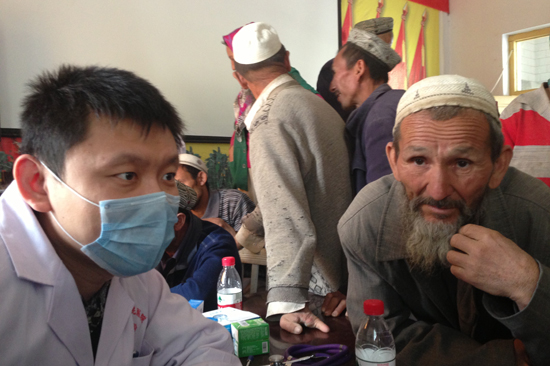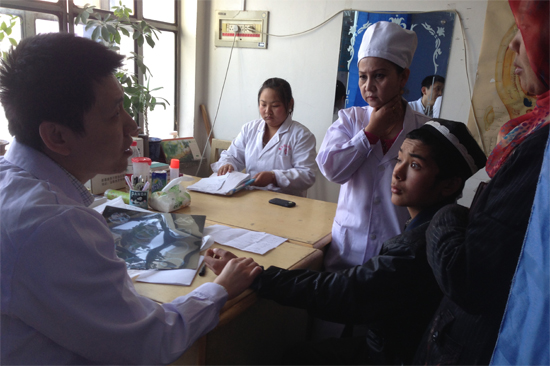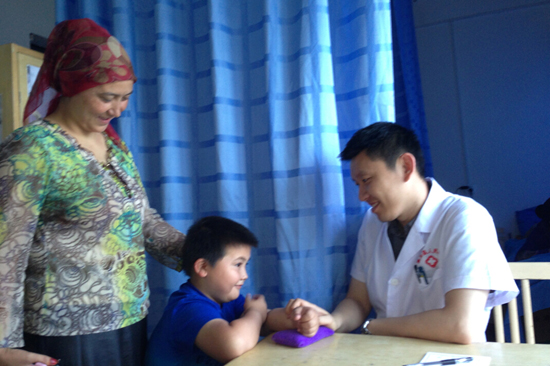"Southern Xinjiang in the early winter, the dust storm has disappeared. After lunch, walking on the streets of Moyu, there is no vehicle passing by. It is so quiet. The golden poplar leaves, creaking, creaking, sniffing the peculiar smell of dust, and looking up, the clear blue sky, close eyes, and the winter sun directly sprinkled on my face, a warm that let me forget my existence, the indescribable sense of feeling, I wish time could rest at this moment. "."
complex, contradictory, sad, reluctant to give up, Wang Peng in his diary describes the mood of the last year's work towards the end of aid. On the one hand, I have finally been looking forward to the days to go home. We can return to my wife and daughter and be reunited with my parents and grandma. On the other hand, with the deepening of the work, I have set up a new friendship and tacit agreement with the colleagues of the medical team and the colleagues of the people's Hospital of the Moyu county. Leaving, perhaps "a farewell, is a life".
the scene of the first arrival of Mo Yu is still vivid. It seems that yesterday is a departure. Looking back on this year, he was in a state of ups and downs: what did I do, what I left behind and what I would take away?
"good doctor" Wang Peng. Before the
1. diagnosis and treatment had been approved from zero to thousands of
to Moyu, Wang Peng had been perturbed: is it possible to carry out the work of traditional Chinese medicine in the western frontier areas with different cultural backgrounds? In fact, because of the special ethnic habits of the minority nationalities, the traditional Chinese medicine in the southern Xinjiang region does not have the same recognition as the mainland, and Wang Peng feels the burden on his shoulders is very heavy.
however, after a month's work, his worries were dispelled. The Uygur people on the diet are mainly with warm and warm mutton. There are many physique in the phlegm heat, the Moyu is also on the edge of the desert, the climate is dry and the wind and sand are large, so the stroke and facial paralysis are more. Having grasped the regional characteristics, customs and habits, and the relationship between common diseases and frequently occurring diseases, Wang Peng had the bottom of his mind. Coupled with the previous work of Dr. Jiang, the Chinese people are more welcome for acupuncture and other Chinese medicine treatments. When Wang Peng came to the hospital for nearly three months, the number of outpatients increased from zero to more than 50 a month, and Uygur patients accounted for more than half. Since then, the outpatient volume is basically stable at 80 people a month. Over the year, the number of outpatients exceeds 1000, and acupuncture treatment reaches 3000.

acupuncture and moxibustion has gradually been recognized by the local people. A large number of patients in the outpatient department are the Uygurs. Photo source: the Chinese civilization network, Beijing Railway Station

Wang Peng for the 12 year old facial paralysis patient Ai Maier Maimaiti diagnosis and treatment. Photo source: in the process of diagnosis and treatment of the Chinese civilization network, Beijing Railway Station
, Wang Peng found that the manual workers in Moyu county are many, because they work hard and work hard, and they are especially easy to suffer from lumbago and leg pain. Most of them are farmers or workers who come to work. By summarizing the characteristics of the disease, Wang Peng made two prescriptions for external use, an external application for lumbago and a prescription for the pain of the legs. The two prescriptions were first dispensed by the Chinese pharmacy and installed in non-woven bags, so that patients can easily operate after returning. In the local area, such prescriptions are always in short supply. Children often do not like soup, and they are afraid of pricking acupuncture. He has introduced the ear point embedding method, which has been welcomed by many parents.
one afternoon, a Uygur boy ran into the consulting room sweatfully and sweaty, and URU said a large paragraph of Uygur, and Wang Pengleng didn't understand it. The little boy pointed his finger to his face. Wang Pengcai discovered that he was a young patient with facial paralysis. He hastened to ask the colleague from the opposite pharmacy to translate. When he heard half of his colleagues, he laughed and laughed and translated, "I am 5 years old, the most handsome boy in the class. All the girls in the class like me, but I can't keep my eyes closed and my mouth is crooked. No one is willing to play with me. You hurry up." Save me! "

Wang Peng is a 5 year old Uygur boy. Photo source: the Chinese civilization network, Beijing Railway Station
at this time, the boy's mother walked into the consulting room, and the expression was very anxious and frowned to describe the child's condition: the child's father was usually busy, the day before the day was rare, he took him out to play, and it was a swimming and barbecue. After second days early, the child was palsy. .
turned around, and Wang Peng made a witty convention with the boy lying on the examining bed.
"promise me a few things, I can turn you into a little handsome boy." Can you do it? "
"can, can do!"
"first, you are not allowed to cry when you are treated; second, no more barbecue, a popsicle; third, go out with a big mask, and no one can see you sick. Can you do it? "
the little boy thought and cried out, "my father is a policeman. I am also brave, I am not afraid of pain, I can do it!"
this, Wang Peng and the little boy's agreement started, every time he used the acupuncture, he used the finest needle, the most light technique, the little boy, every time the tears in the eyes all turn, but is not crying, and always on time to the hospital, a treatment is not delayed. Two weeks later, the boy recovered basically, and his parents accompanied him for the last time. After finishing the treatment, looking at the family's back from the consulting room, Wang Peng felt that this moment should be the best interpretation of happiness.